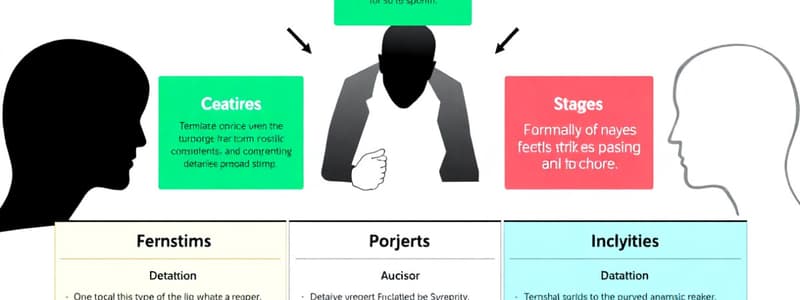Podcast
Questions and Answers
What distinguishes a team from a work group?
What distinguishes a team from a work group?
- Strong focused leadership
- Top-down communication
- Independent work assignments
- Shared leadership and joint accountability (correct)
Which of the following is a defining feature of a functional team?
Which of the following is a defining feature of a functional team?
- Teams have no specific end date
- Each team member is self-directed
- Members work independently but share common successes (correct)
- Members from various departments work toward a common goal
What type of team is typically formed to handle a merger or acquisition?
What type of team is typically formed to handle a merger or acquisition?
- Cross-functional team (correct)
- Self-managing team
- Virtual team
- Functional team
In which type of team do members gradually take responsibility for their direction with minimal oversight?
In which type of team do members gradually take responsibility for their direction with minimal oversight?
What is the primary purpose of a team charter?
What is the primary purpose of a team charter?
Which stage of Tuckman’s model is characterized by establishing ground rules and team formalities?
Which stage of Tuckman’s model is characterized by establishing ground rules and team formalities?
During which stage of team development does a project manager use a servant leadership style to help clarify roles and address conflicts?
During which stage of team development does a project manager use a servant leadership style to help clarify roles and address conflicts?
What leadership style is best suited for a high-performing, self-managing team during the Performing stage?
What leadership style is best suited for a high-performing, self-managing team during the Performing stage?
Which leadership style focuses on allowing team members the freedom to work independently with little interference?
Which leadership style focuses on allowing team members the freedom to work independently with little interference?
What is the main purpose of the Norming stage in team development?
What is the main purpose of the Norming stage in team development?
In the Five Dysfunctions of a Team model, what is the root cause of an absence of trust?
In the Five Dysfunctions of a Team model, what is the root cause of an absence of trust?
Which type of conflict avoidance results in artificial harmony within a team?
Which type of conflict avoidance results in artificial harmony within a team?
What is a key characteristic of the Storming stage in Tuckman’s model?
What is a key characteristic of the Storming stage in Tuckman’s model?
What does GRPI stand for in assessing team effectiveness?
What does GRPI stand for in assessing team effectiveness?
During which stage of team development is a team most likely to engage in open and trusting behavior?
During which stage of team development is a team most likely to engage in open and trusting behavior?
What is an effective tactic for addressing a lack of trust within a team?
What is an effective tactic for addressing a lack of trust within a team?
What is the purpose of using a RACI chart in a project?
What is the purpose of using a RACI chart in a project?
Which stage in the Drexler/Sibbet Team Performance Model involves aligning team systems and processes with the team’s purpose?
Which stage in the Drexler/Sibbet Team Performance Model involves aligning team systems and processes with the team’s purpose?
In the context of team development, what does “delegation” mean?
In the context of team development, what does “delegation” mean?
Which of the following leadership styles is suggested for the Adjourning stage of team development?
Which of the following leadership styles is suggested for the Adjourning stage of team development?
What is the primary focus of the Performing stage in Tuckman's model?
What is the primary focus of the Performing stage in Tuckman's model?
Which team type is most typical for a group of employees pulled together from different departments to deliver a specific project?
Which team type is most typical for a group of employees pulled together from different departments to deliver a specific project?
In Patrick Lencioni's model, what does "inattention to results" often lead to?
In Patrick Lencioni's model, what does "inattention to results" often lead to?
What is the main role of a team leader during the Forming stage of team development?
What is the main role of a team leader during the Forming stage of team development?
Which tool can be used to assess and measure the performance of a high-performing team?
Which tool can be used to assess and measure the performance of a high-performing team?
What does "fear of conflict" prevent in teams, according to Lencioni's model?
What does "fear of conflict" prevent in teams, according to Lencioni's model?
Which stage in the Drexler/Sibbet Team Performance Model focuses on setting direction and clarifying the team’s purpose?
Which stage in the Drexler/Sibbet Team Performance Model focuses on setting direction and clarifying the team’s purpose?
In which type of team are members usually empowered to make decisions without much oversight?
In which type of team are members usually empowered to make decisions without much oversight?
What is one key sign of a dysfunctional team related to accountability?
What is one key sign of a dysfunctional team related to accountability?
In the Five Dysfunctions of a Team model, what does the "lack of commitment" result in?
In the Five Dysfunctions of a Team model, what does the "lack of commitment" result in?
Which of the following helps create a positive team environment during the Norming stage?
Which of the following helps create a positive team environment during the Norming stage?
What does the term "team charter" refer to in team development?
What does the term "team charter" refer to in team development?
During the Storming stage, which leadership approach is most effective?
During the Storming stage, which leadership approach is most effective?
What is the role of participative leadership in a high-performing team?
What is the role of participative leadership in a high-performing team?
Which dysfunction of a team is directly related to ego and status-seeking behaviors?
Which dysfunction of a team is directly related to ego and status-seeking behaviors?
What type of team member interaction is encouraged in a self-managing team?
What type of team member interaction is encouraged in a self-managing team?
Which dysfunction arises from the unwillingness of team members to hold each other accountable?
Which dysfunction arises from the unwillingness of team members to hold each other accountable?
What is the main purpose of onboarding new team members effectively?
What is the main purpose of onboarding new team members effectively?
Which step in the delegation process involves creating an obligation for the delegate to complete the task?
Which step in the delegation process involves creating an obligation for the delegate to complete the task?
Which type of communication is most typical for a Baby Boomer in the workplace?
Which type of communication is most typical for a Baby Boomer in the workplace?
Which leadership style is best suited for the Adjourning stage to wrap up the project effectively?
Which leadership style is best suited for the Adjourning stage to wrap up the project effectively?
How does the Drexler/Sibbet Team Performance Model help team leaders?
How does the Drexler/Sibbet Team Performance Model help team leaders?
Which leadership style allows maximum autonomy to team members who are capable and independent?
Which leadership style allows maximum autonomy to team members who are capable and independent?
What is one benefit of using a RACI chart for a team project?
What is one benefit of using a RACI chart for a team project?
Which step in the delegation process includes making the delegation known to others?
Which step in the delegation process includes making the delegation known to others?
What type of leadership is most effective during the Performing stage, where team members are capable and self-sufficient?
What type of leadership is most effective during the Performing stage, where team members are capable and self-sufficient?
In Lencioni's model, what is a key consequence of avoidance of accountability?
In Lencioni's model, what is a key consequence of avoidance of accountability?
Which of the following is a critical element of team effectiveness as defined by GRPI?
Which of the following is a critical element of team effectiveness as defined by GRPI?
Which tool is used to develop team cohesion and clarify roles, values, and processes?
Which tool is used to develop team cohesion and clarify roles, values, and processes?
What type of team is described as members working together across various functions to achieve a common goal within a set timeline?
What type of team is described as members working together across various functions to achieve a common goal within a set timeline?
Flashcards are hidden until you start studying
Study Notes
Team vs. Work Group
- A team features shared leadership and joint accountability, contrasting with work groups that often have strong focused leadership.
- In a functional team, members work independently yet share common successes, enabling teamwork without complete interdependence.
Team Types and Functions
- Cross-functional teams, involving members from various departments, are commonly formed to handle mergers and acquisitions.
- Self-managing teams gradually empower members to take on responsibilities with minimal oversight.
- A team charter clarifies direction, boundaries, and working culture for the members.
Tuckman’s Stages of Team Development
- The Forming stage involves establishing ground rules and team formalities.
- During the Storming stage, project managers employ servant leadership to clarify roles and address conflicts.
- In the Norming stage, teams focus on conflict resolution and building cohesion.
- The Performing stage is centered on delivering results and optimizing collaboration.
Leadership Styles
- Laissez-faire leadership is most suited for high-performing, self-managing teams that value independent work.
- Servant leadership effectively supports teams during the Storming stage by encouraging dialogue and resolving tensions.
- In the Adjourning stage, a transactional style helps bring projects to effective closure.
Trust and Team Dynamics
- An absence of trust stems from reluctance to be vulnerable, limiting a team’s effectiveness.
- Fear of conflict leads to artificial harmony, stifling healthy discussions and decisions.
- Open and clear communication during the Norming stage fosters a positive team climate.
Assessing Team Effectiveness
- The GRPI model assesses Goals, Roles, Processes, and Interpersonal Relationships to gauge team effectiveness.
- RACI charts clarify roles and responsibilities, ensuring proper accountability and reducing misunderstandings.
Addressing Team Challenges
- Dysfunctional teams face issues like low accountability and commitment, negatively impacting productivity and morale.
- Lack of accountability leads to reduced standards and missed deadlines.
- To counteract absence of trust, team members should share personal stories, enhancing interpersonal bonds.
Communication and Delegation
- Effective onboarding ensures new members understand their roles and the team culture.
- In the delegation process, creating accountability is critical for task completion.
Communication Preferences Across Generations
- Baby Boomers typically prefer email and telephone communication over instant messaging or social media.
Team Cohesion and Outcomes
- Team cohesion is promoted via tools like the team charter, which outlines roles, values, and processes.
- Clear goals are essential for team effectiveness, as outlined in the GRPI framework.
Cross-functional Collaboration
- Cross-functional teams involve diverse skill sets working toward a shared goal within a set timeline, enhancing innovation and collaboration.
Development Models
- The Drexler/Sibbet Team Performance Model provides insights into aligning team systems and processes with goals.
- Maximum autonomy in capable teams may be achieved through a laissez-faire leadership style, encouraging self-direction.
Studying That Suits You
Use AI to generate personalized quizzes and flashcards to suit your learning preferences.




